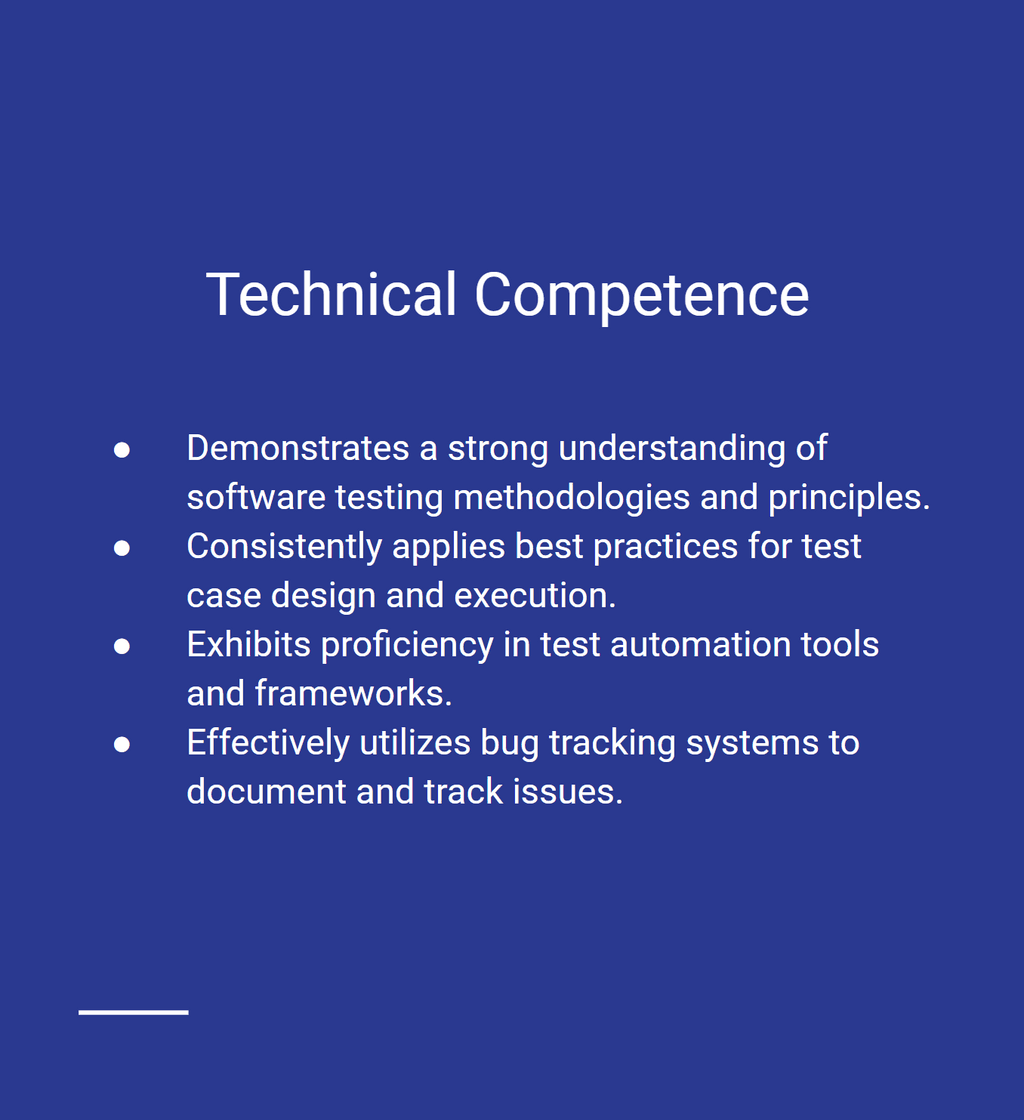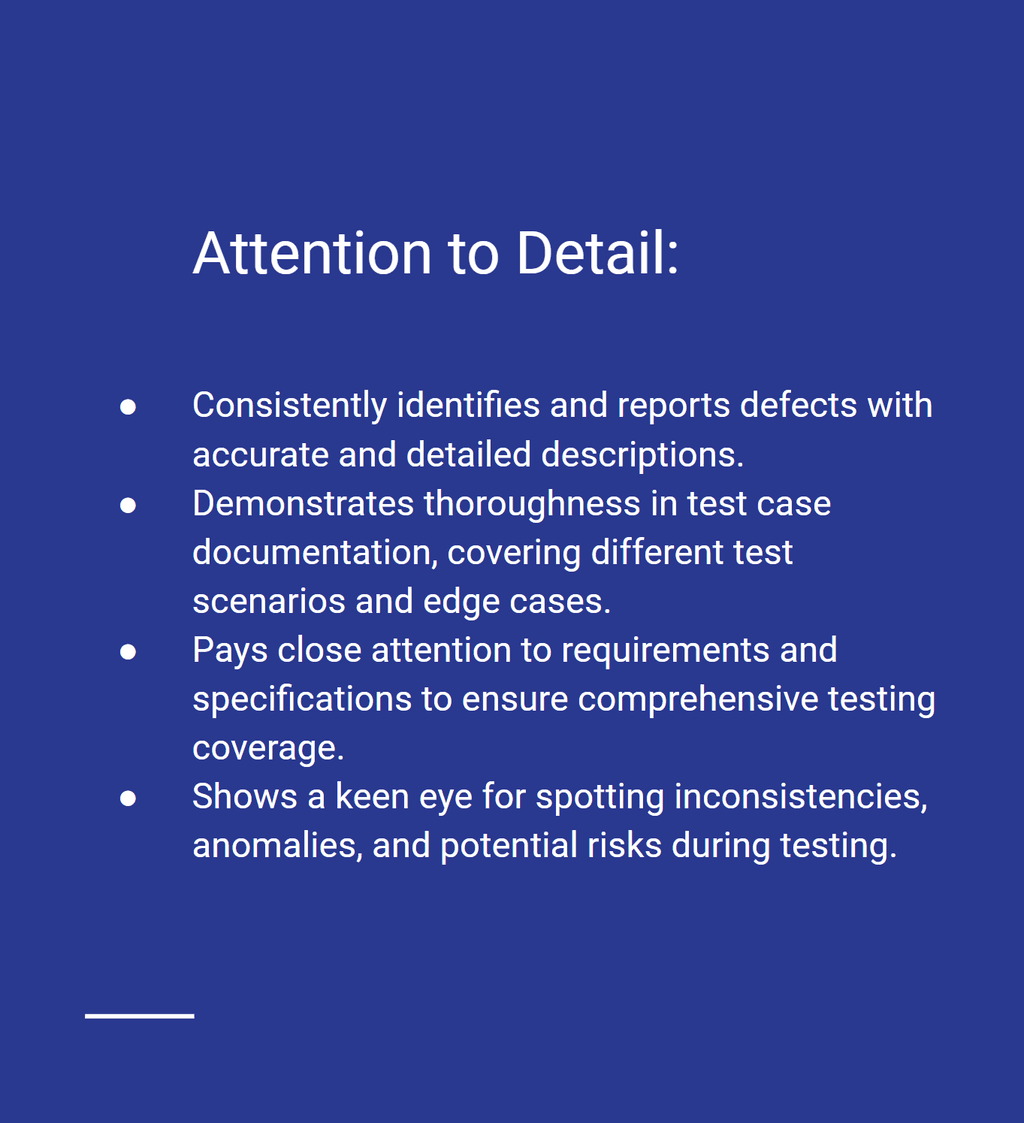Performance reviews are a critical tool for evaluating the contributions and progress of employees in any industry. In the dynamic field of software testing, performance reviews play a crucial role in identifying strengths, areas for improvement, and ensuring the overall growth of software testers. However, conducting effective performance reviews requires careful planning and the use of appropriate evaluation criteria. In this blog post, we will provide simplified examples of performance review criteria for software testers, enabling managers and team leaders to conduct meaningful and productive evaluations.
1. Technical Competence:
One of the fundamental aspects of evaluating software testers is assessing their technical competence. Here are a few simplified performance review examples related to technical skills:
-
Demonstrates a strong understanding of software testing methodologies and principles.
-
Consistently applies best practices for test case design and execution.
-
Exhibits proficiency in test automation tools and frameworks.
-
Effectively utilizes bug tracking systems to document and track issues.

2. Attention to Detail:
Software testers are known for their meticulousness and attention to detail. Consider these examples when evaluating their attention to detail:
-
Consistently identifies and reports defects with accurate and detailed descriptions.
-
Demonstrates thoroughness in test case documentation, covering different test scenarios and edge cases.
-
Pays close attention to requirements and specifications to ensure comprehensive testing coverage.
-
Shows a keen eye for spotting inconsistencies, anomalies, and potential risks during testing.

3. Communication and Collaboration:
Software testing is a collaborative endeavor that requires effective communication within the team and with stakeholders. Consider the following review examples related to communication and collaboration skills:
- Clearly articulates testing progress, challenges, and results to team members and stakeholders.
- Actively participates in team discussions and provides constructive feedback.
- Collaborates effectively with developers and other team members to resolve issues and improve the quality of the product.
- Demonstrates excellent written and verbal communication skills.
4. Adaptability and Problem-Solving:
Software testers often encounter unexpected challenges and need to be adaptable in finding solutions. These examples focus on evaluating adaptability and problem-solving skills:
- Demonstrates flexibility in adjusting testing strategies and approaches based on evolving project requirements.
- Quickly adapts to new technologies, tools, and methodologies.
- Exhibits strong problem-solving abilities in identifying the root cause of complex issues and proposing effective solutions.
- Proactively suggests process improvements and contributes to the overall efficiency of the testing team.
5. Time Management and Efficiency:
Efficient time management is crucial for software testers to meet project deadlines. Consider these examples when evaluating time management and efficiency:
- Demonstrates the ability to prioritize testing tasks effectively.
- Consistently delivers high-quality test results within specified timelines.
- Uses time-tracking tools efficiently to monitor and optimize testing efforts.
- Proactively identifies bottlenecks and suggests strategies for improving testing efficiency.
Performance reviews for software testers provide a valuable opportunity to recognize their accomplishments, identify areas for improvement, and facilitate their professional growth. By utilizing the simplified examples provided in this blog post, managers and team leaders can conduct more effective and meaningful evaluations. Remember, each performance review should be tailored to the specific needs and objectives of the organization and the individual tester. With regular and constructive feedback, software testers can thrive, resulting in enhanced product quality and customer satisfaction.
Frequently Asked Questions
Q1: How often should performance reviews be conducted for software testers?
A1: Performance reviews for software testers should ideally be conducted at least once a year. However, some organizations may opt for more frequent reviews, such as every six months, to provide timely feedback and support professional development.
Q2: Who should be involved in the performance review process for software testers?
A2: The performance review process for software testers typically involves their immediate supervisors or managers. Additionally, input may be gathered from team members, stakeholders, or clients who have interacted closely with the tester's work.
Q3: What should be the focus of performance reviews for software testers?
A3: Performance reviews for software testers should focus on assessing their technical competence, attention to detail, communication and collaboration skills, adaptability and problem-solving abilities, time management, and efficiency. These aspects collectively contribute to their effectiveness in the role.
Q4: How can performance reviews support the growth of software testers?
A4: Performance reviews provide an opportunity to identify the strengths and areas for improvement of software testers. Constructive feedback and goal setting during these reviews can guide their professional growth, promote skill development, and address any performance gaps.
Q5: Can performance reviews be used to determine promotions or salary increases?
A5: Yes, performance reviews are often used as a basis for determining promotions or salary increases for software testers. Positive performance reviews that highlight exceptional contributions and growth can support the case for advancement and improved compensation.
Q6: What should be done if a software tester receives a negative review?
A6: If a software tester receives a negative review, it is essential to provide constructive feedback, clearly communicate areas for improvement, and support their development through training or mentorship. The focus should be on helping them learn and grow rather than punitive measures.
Q7: How can the performance review process be made more effective and meaningful?
A7: To make the performance review process more effective and meaningful, it is crucial to set clear expectations, establish measurable goals, provide timely feedback, encourage open communication, and tailor the review process to the specific needs and objectives of the organization and individual tester.
